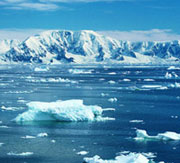|
 |
|
Last year was warmest in a
century |
Last year was the warmest in a century, nosing out 1998, a federal analysis
concludes.
Researchers calculated that 2005 produced the highest annual average
surface temperature worldwide since instrument recordings began in the
late 1800s, said James Hansen, director of NASA's Goddard Institute for
Space Studies.
The result confirms a prediction the institute made in December.
In a telephone interview, Hansen said the analysis estimated
temperatures in the Arctic from nearby weather stations because no direct
data were available. Because of that, "we couldn't say with 100 percent
certainty that it's the warmest year, but I'm reasonably confident that it
was," Hansen said.
More important, he said, is that 2005 reached the warmth of 1998
without help of the "El Nino
of the century" that pushed temperatures up in 1998.
Over the past 30 years, Earth has warmed a bit more than 1 degree in
total, making it about the warmest it's been in 10,000 years, Hansen said.
He blamed a buildup of heat-trapping greenhouse gases.
Jay Lawrimore of the federal government's National Climatic Data Center
said his own center's current data suggest 2005 came in a close second to 1998, in part because of how
the Arctic was factored in. But he said a forthcoming analysis "will
likely show that 2005 is slightly warmer than 1998."
(Agencies) |
一份美国分析报告显示:2005年是近一个世纪以来最热的一年,气温略微超过了1998年的记录。
美国航空航天局戈达德空间研究中心的主任汉森说:根据研究人员的数据分析,
自19世纪后期有气象资料纪录以来,2005年是世界范围内地球表面平均气温最高的年份。
这份研究结果印证了去年12月份研究中心所做的预测。
汉森在一次电话采访中说,因为无法获取有关北极圈的第一手气象资料,北极圈的气温是根据极圈附近气象站的数据资料分析估算得出的。由此,"我们不敢完全肯定05年气温是历年之最,但我对这个结论还是相当有把握。"
汉森说,更重要的是,有别于1998年,2005年的高温天气没有受到"百年不遇的厄尔尼诺"现象影响。
他同时说,在过去的30年里,地球气温上升了1度多,成为1万年来全球最热的时期。 汉森认为"温室气体"排放量增加是罪魁祸首。
美国国家气候数据中心的杰尹·劳里莫尔说,中心现有的数据显示,2005年气温略低于1998年,结论不同可能与如何处理北极圈的气候数据有关。但他也表示,即将出炉的分析结果可能会显示"2005年气温略高于1998年"。
(中国日报网站编译)
|